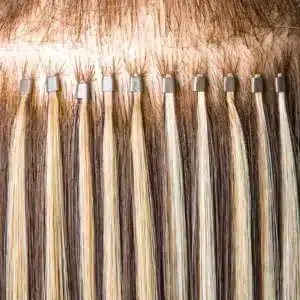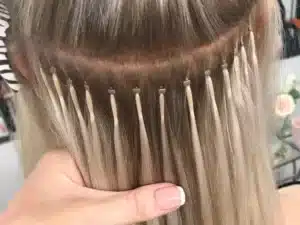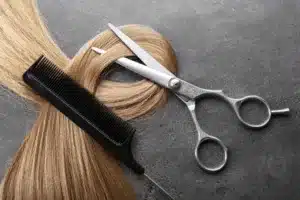Customers often ask you what types of hair wefts are available and what the differences are between them. You sell or install wefts every week, but the “weft” is not one thing. Which build fits your client, your budget, and your workflow?
The main types in the current hair extensions market: machine hair wefts, volume hair wefts, hand-tied hair wefts, genius hair wefts, flat hair wefts, volume-genius hair wefts, butterfly hair wefts, invisible tape weft, and long tape weft.Hair weaves vary by construction, profile, cuttability, and comfort.
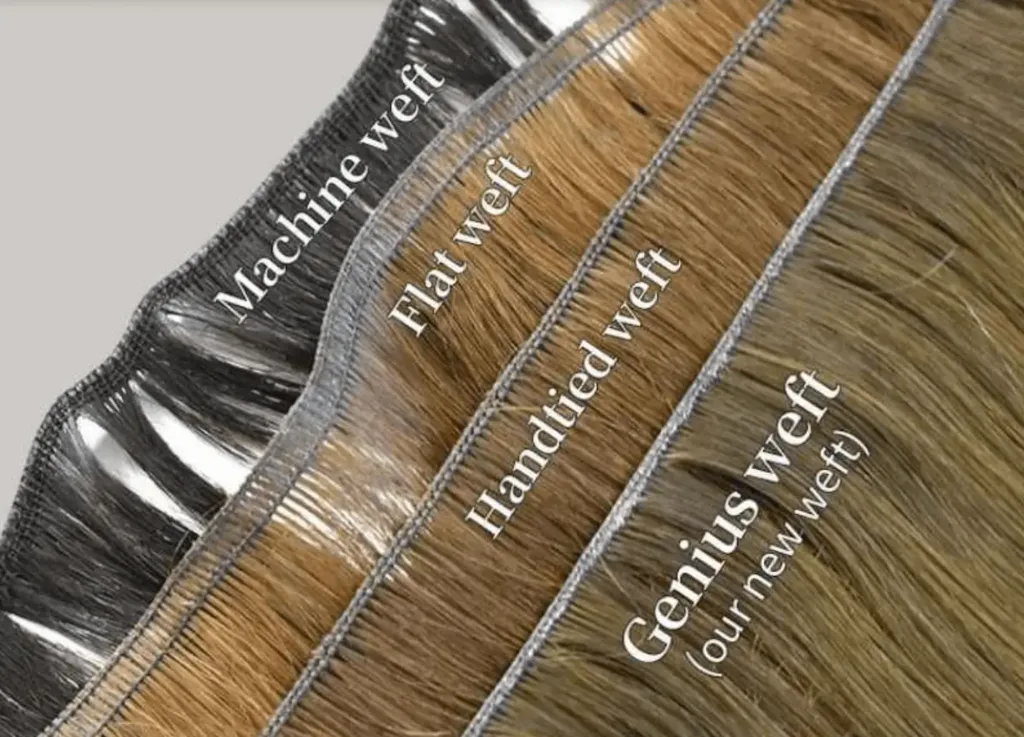
You want clear answers on hair weaves, not hype. Here’s the factory view that helps you buy smarter and install faster.You’ll find the main weave types, how they’re made, where they shine, and what to avoid—so your team orders right the first time and gets repeat clients.
What are the different types of hair weaves?
Too many names slow decisions. You need a clean map that links structure to results.Professionally, hair weaves fall into machine-made, hand-made, hybrid, and tape-assisted categories. Each has a build logic that affects thickness, cuttability, comfort, and speed.
Most wholesale “weft hair extensions” are variations on how strands are joined at the top (the seam). That joining method controls four things that matter in salon work: thickness at the seam, whether you can cut the weft without shedding, the presence of “return hair” (mustache), and how fast you can install at scale. Think of the families like this:
- Machine Wefts (Regular): classic two-layer stitch, sturdy, cuttable, slight bulk. Good all-rounder for varied hair types and price points.
- Volume Wefts: triple-layer build for fast fullness with fewer tracks. They reduce install time but add thickness at the seam.
- Handtied Wefts: thin, flat, light. They look invisible and feel premium. They shouldn’t be cut; you plan sections before sewing.
- Genius Wefts: handtied-thin seam without the cutting limit. No return hair. They blend like handtied but behave like machine wefts during customization.
- Flat Wefts: sealed, flexible, thinner than regular machine seams. They’re discreet and cuttable, great for hidden looks at scale.
- Volume Genius: the density of volume wefts plus the invisibility/cuttability of genius. They solve two problems at once for premium sets.
- Butterfly Wefts: innovative strip with evenly spaced holes. The needle passes quickly; installs move faster while staying flat.
- Invisible Tape Weft: pre-taped, injection-thin seam for a true “no-bulk” line. Hybrid of weft look with tape speed.
- Long Tape Weft: extended tape strip length designed for rapid, large coverage installs—ideal for high-volume services and uniform lines.
When you line up client expectations (thin seam, speed, reusability, comfort) with this map, “best” becomes clear for each service niche. High-end salons often migrate from handtied to genius or volume genius for flexibility, speed, and comfort without sacrificing the luxury finish.
1.Machine Hair Hair wefts
You want dependable stock that cuts clean and holds stitches well.Machine wefts bring rugged build, predictable density, and wide color runs at scale. They’re versatile, cuttable, and budget-friendly compared to ultra-thin hybrids.

Machine wefts are the backbone of many pro menus because they balance cost, durability, and flexibility. A regular machine weft uses a two-layer hair assembly sewn by machine. This creates a seam with enough substance to handle cutting and re-sizing without dramatic shedding. Technicians appreciate the predictability; buyers appreciate consistent pricing and broad availability in lengths and shades. The trade-off is bulk. The top is thicker than handtied or genius, so it sits a bit higher on the head, which may show in ultra-fine hair or high-exposure styles. For everyday density builds, though, it performs.
Key technical notes:
- Structure: double-sewn seam; typically includes return hair that may need smoothing.
- Cuttability: yes; seal edges if needed depending on brand.
- Comfort: moderate; good for medium to thick natural hair.
- Speed: standard sewing pace; straightforward for teams trained on machine seams.
| Aspect | Pros | Cons | Best For |
|---|---|---|---|
| Build | Durable, cuttable | Thicker seam | General installs |
| Cost | Efficient cost per gram | Less “invisible” | Value packages |
| Operations | Easy inventory | Slight mustache | Training salons |
2.Volume Hair Wefts
You need bigger results with fewer rows and faster chair turns.Volume wefts deliver dense fullness from fewer tracks. They speed up installs and reduce seam stacking, improving comfort for many clients.

Volume wefts typically stack three hair layers on a single seam. That means you lay fewer rows while achieving a fuller result. For busy salons, this is a practical win because you cut chair time without reducing the “wow.” Clients feel fewer rows, so comfort often improves despite the seam being thicker than handtied or genius. Color runs and length options are similar to machine wefts, so stocking is simple.
Technical takeaways:
- Structure: triple-layer seam (or equivalent density build).
- Cuttability: yes; sealing practice recommended per brand SOP.
- Comfort: good because fewer rows; seam itself is thicker than thin hybrids.
- Speed: faster than laying many thin rows; great for glam looks.
| Aspect | Pros | Cons | Best For |
|---|---|---|---|
| Density | Big volume fast | Thicker seam | Fullness clients |
| Time | Fewer rows | Less micro-custom | Events, glam sets |
| Cost | Efficient per result | Not for ultra-fine hairlines | High-output teams |
3.Handtied Hair Wefts
You want the flattest, most seamless finish for elite clients.Handtied wefts lay ultra-flat and look invisible. They’re light, soft, and refined. They shouldn’t be cut, so planning is everything.
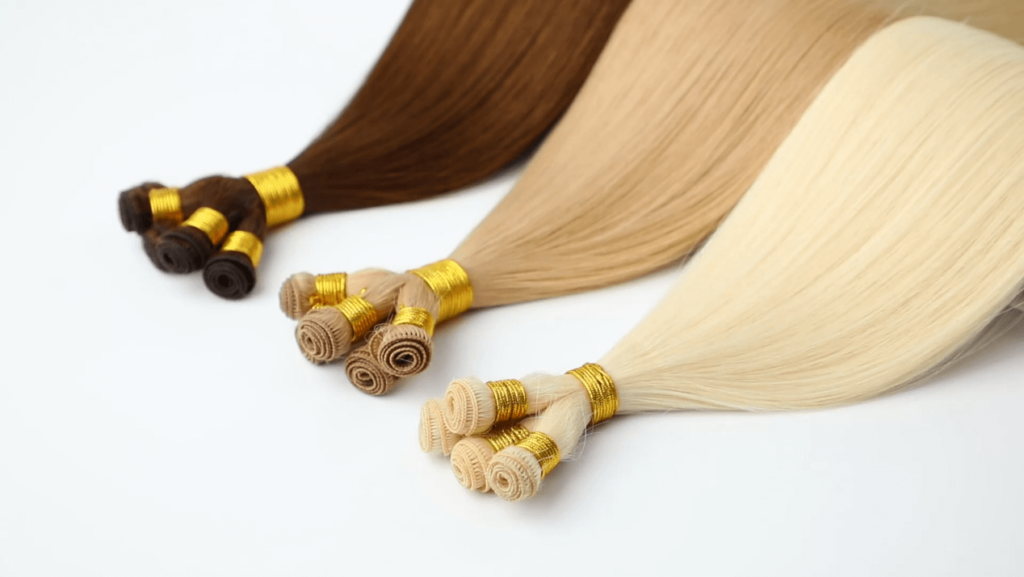
Handtied is the luxury original. Craftspeople stitch hair by hand into an ultra-thin seam. The result vanishes under the hair, even with bright lights or wind. Clients feel almost nothing at the base. The limitation is customization: you avoid cutting handtied, or you’ll cause shedding. This makes consultation and section planning critical. Skilled stylists pre-plan widths or use multiple short pieces to match head shape without cutting. Maintenance is routine and similar to other sewn methods, but handling must stay gentle at the seam.
Technical takeaways:
- Structure: hand-sewn, minimal seam height, often with minimal return hair feel.
- Cuttability: avoid; order multiple widths for mapping.
- Comfort: excellent; premium “second skin” feel.
- Speed: slightly slower; precision work pays off in finish.
| Aspect | Pros | Cons | Best For |
|---|---|---|---|
| Aesthetics | Flattest look | Not cuttable | Luxury installs |
| Feel | Light, soft | Planning needed | Fine hair clients |
| Brand | Premium story | Higher cost | High-end salons |
4.Genius Hair Wefts
You want handtied-thin looks with the freedom to cut—and no mustache.Genius wefts combine a thin, flexible seam, no return hair, and true cuttability. They look invisible and work fast for modern pro teams.

Genius wefts were engineered to remove the pain points of both machine and handtied. The seam is very thin, so it lays close like handtied. There’s no mustache poking the scalp. Crucially, you can cut to size without shedding, so customization is quick and precise. Since entering top-tier salons around 2022, genius quickly became a hero SKU because it cuts labor time and gives a luxury finish. For fine hairlines or high-movement styles, the blend stands out. For wholesalers, it’s a safe bet because it satisfies both technicians and clients.
Technical takeaways:
- Structure: ultra-thin seam, sealed for cuttability, no return hair.
- Cuttability: yes—major advantage over handtied.
- Comfort: excellent; smooth base with minimal irritation.
- Speed: high; tailored fits without advance width planning.
| Aspect | Pros | Cons | Best For |
|---|---|---|---|
| Finish | Invisible-thin | Higher unit price | Premium salons |
| Workflow | Cuttable, no mustache | Training on sealing SOP | Busy stylists |
| Results | Fast, precise | Stock management | Fine-to-medium hair |
5.Flat Hair Wefts
You want a neat, sealed seam with flexible handling and hidden results.Flat wefts use sealed, slim seams that flex with the head. They’re cuttable and comfortable, with a clean edge that resists fray.
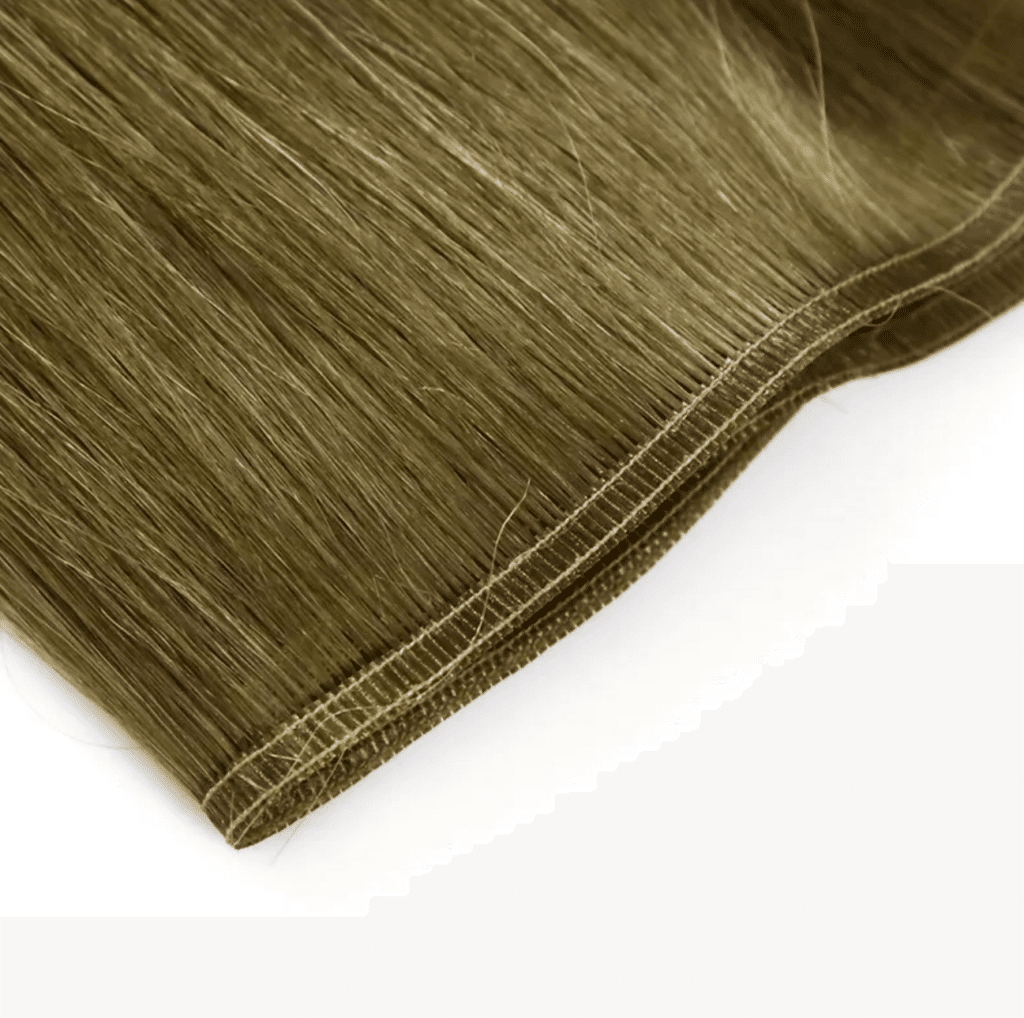
Flat wefts sit between classic machine and genius in look and behavior. The seam is thinner and more flexible than regular machine wefts, so it hides better in fine to medium hair. Sealed edges reduce shedding and allow cutting, which is key for clean mapping. For teams that want a straightforward, clean seam without the cost of genius, flat wefts make sense. They’re a great “hidden look at scale” workhorse and support large salon rosters that need repeatable outcomes.
Technical takeaways:
- Structure: sealed, slim seam; flexible; typically cuttable.
- Cuttability: yes; simple edge care keeps it tidy.
- Comfort: strong; low profile versus classic machine seams.
- Speed: efficient; fast mapping and sewing.
| Aspect | Pros | Cons | Best For |
|---|---|---|---|
| Build | Sealed, neat | Not as ultra-thin as genius | Hidden looks |
| Cost | Mid-tier value | Slight seam feel | Multi-chair salons |
| Ops | Easy training | Moderate premium | Everyday blends |
6.Volume Genius Hair Wefts
You want the density of volume wefts with the invisibility and cuttability of genius.Volume genius joins thick output with a thin, cuttable seam and no mustache, so clients get big hair without bulky bases.’=
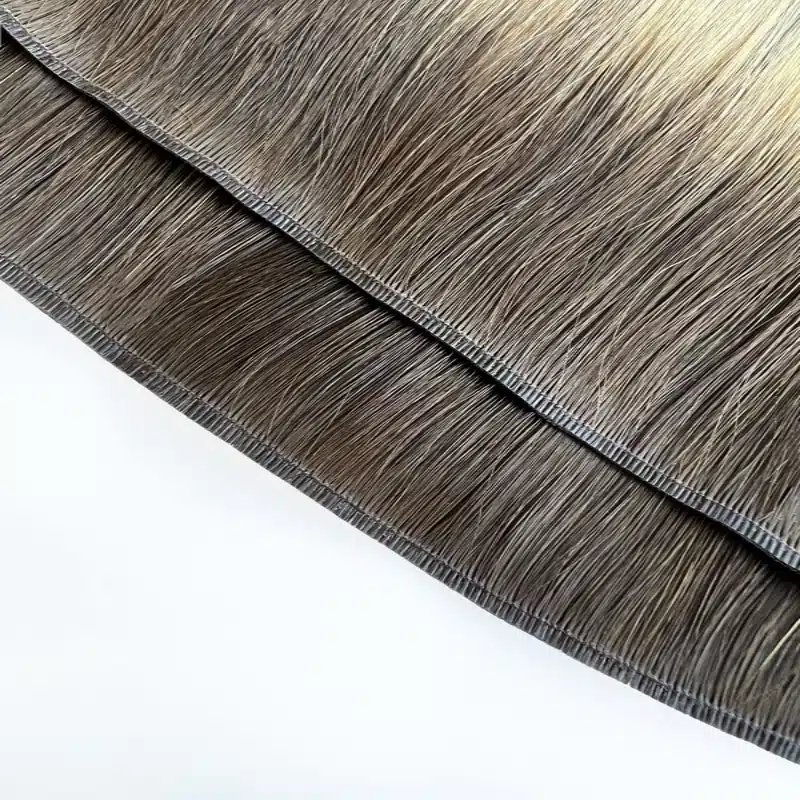
Volume genius is the logical evolution for premium salons that sell both glam volume and micro-thin bases. The construction stacks density in dual or triple layers while keeping the seam thin and cuttable like standard genius. No return hair improves scalp comfort and reduces irritation complaints. It’s designed for high-ticket transformations where you want fewer rows, high density, and an invisible finish in photos and daylight. For managers, it simplifies the menu: one SKU family serves bridal, glam, and luxury volume clients.
Technical takeaways:
- Structure: multi-layer density + genius-thin, cuttable seam, no mustache.
- Cuttability: full; precise mapping remains quick.
- Comfort: excellent despite density; fewer rows than many thin options.
- Speed: high; fast transformations with minimal stacking.
| Aspect | Pros | Cons | Best For |
|---|---|---|---|
| Density + Finish | Big hair, thin base | Premium price | Luxury volume |
| Chair Time | Fewer rows | Requires supply planning | Bridal, events |
| Client Feel | No irritation | Training on tension | Photo-heavy work |
7.Butterfly Hair Wefts
You want faster sewing without giving up a flat, hidden finish.Butterfly wefts use a thin strip with evenly spaced holes. The needle passes through fast, reducing install time while keeping the base flat.
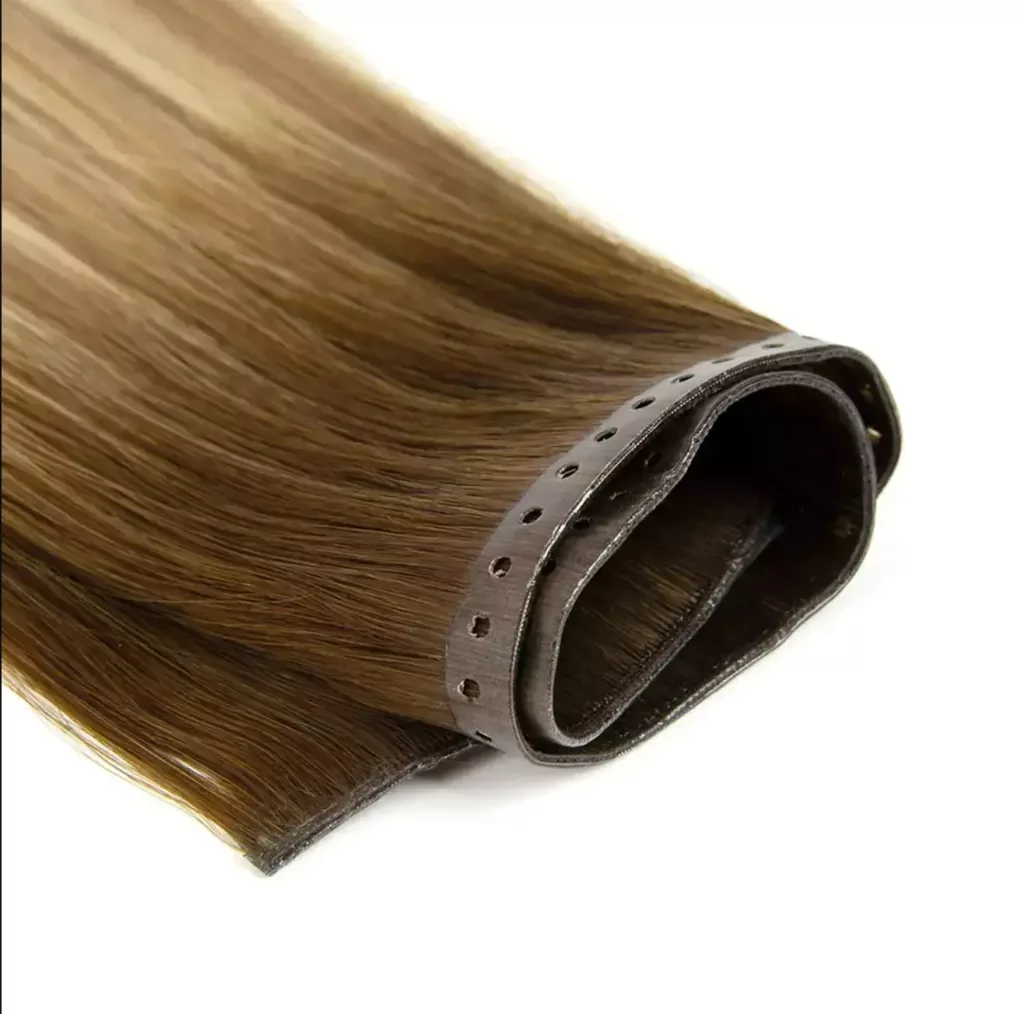
Butterfly wefts address the reality of busy chairs. The perforated strip gives you predictable pass-through points, which speeds sewing and keeps tension consistent. That consistency produces a smooth, even lay across the head shape. The seam remains thin. The result is a pro-time saver that doesn’t sacrifice finish. For multi-chair salons, that throughput matters—more clients served, consistent outcomes, less fatigue for techs.
Technical takeaways:
- Structure: thin seam with symmetrical holes.
- Cuttability: yes; holes guide trims and stitches.
- Comfort: high—thin base with even tension.
- Speed: excellent; guided sewing reduces fiddling.
| Aspect | Pros | Cons | Best For |
|---|---|---|---|
| Speed | Guided needle path | New pattern learning | High-volume salons |
| Finish | Flat, even | Stock unique SKU | Consistency lovers |
| Training | Easy to standardize | Sourcing variants | Franchise teams |
8.Invisible Tape Hair Weft
You want tape-speed installs with a weft-like, injection-thin seam.Invisible tape wefts are pre-taped strips with an ultra-thin injected top. They install fast, look seamless, and cut styling time.

Invisible tape wefts merge two winning ideas: the quick application of tape and the ultra-thin line of injected seams. The pre-taped format reduces setup time. The injection technology makes the top almost undetectable, even on fine hair. For teams who run mixed menus (weft + tape), this hybrid helps standardize the finish while keeping speed. Removal and re-taping follow tape SOPs, so your team can move between methods without a big learning curve.
Technical takeaways:
- Structure: injected, ultra-thin top; pre-applied tape.
- Cuttability: manageable along non-adhesive sections; follow brand SOP.
- Comfort: very high; minimal seam height.
- Speed: top-tier; perfect for tight schedules.
| Aspect | Pros | Cons | Best For |
|---|---|---|---|
| Speed | Tape-fast | Adhesive care | Fine hair clients |
| Finish | Ultra-thin | Tape maintenance | Busy stylists |
| Ops | Cross-trainable | Stock tape rolls | Hybrid menus |
9.Long tape weft hair extensions
You want long, continuous coverage that installs fast and looks clean.Long tape wefts use an extended tape strip to cover large sections quickly. They’re ideal for uniform density builds.
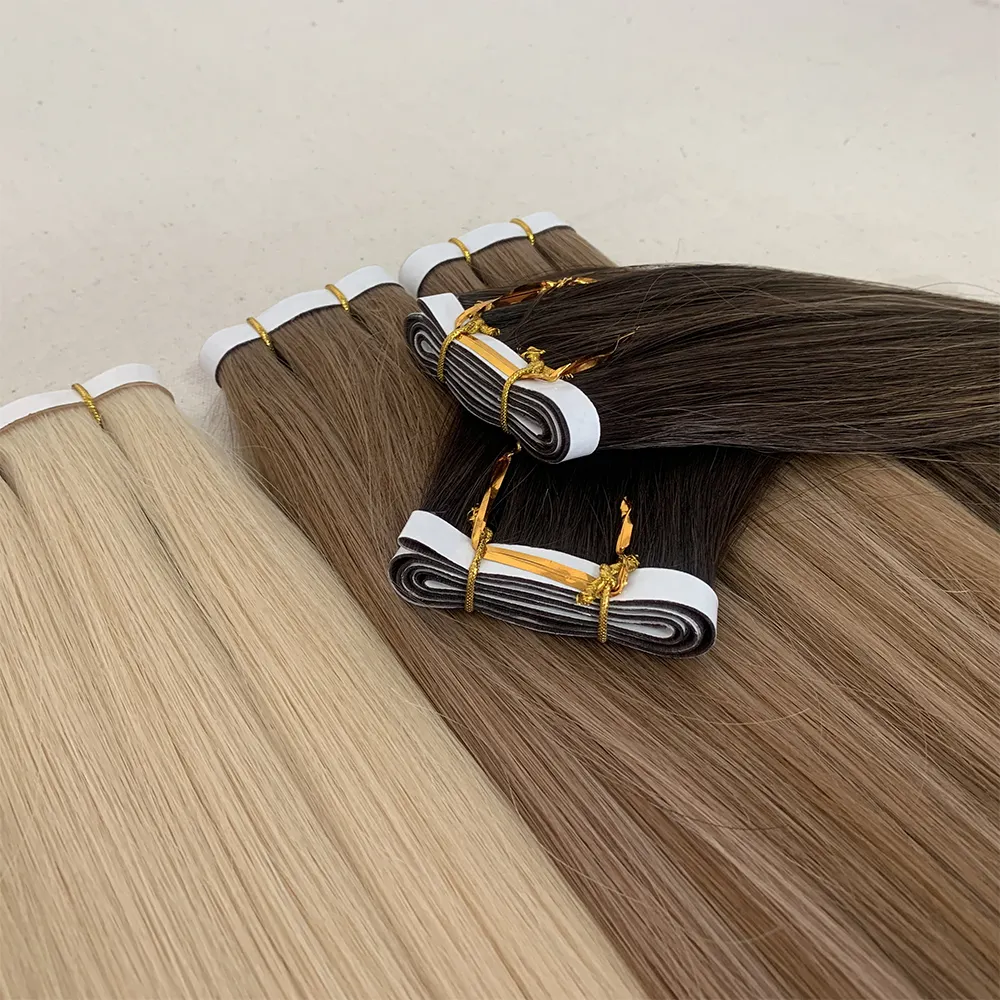
Long tape wefts simplify big jobs. The extended tape length reduces starts and stops, which makes sections more uniform and cuts total time. For brand photo shoots, influencers, or brides with full-head targets, this format brings order and speed. Technicians still follow tape best practices: clean sections, even pressure, and solvent-safe removal. Because the run is long, you also reduce micro-gaps that sometimes appear when stacking many short pieces.
Technical takeaways:
- Structure: continuous pre-taped strip; injection-thin top when premium.
- Cuttability: along safe zones; observe adhesive edges.
- Comfort: excellent; fewer junctions means smoother feel.
- Speed: outstanding for full-head transformations.
| Aspect | Pros | Cons | Best For |
|---|---|---|---|
| Coverage | Fewer breaks | Precise mapping needed | Full-head builds |
| Time | Fast installs | Removal discipline | Campaign work |
| Finish | Uniform lines | Tape inventory | Bridal, media jobs |
Which weave hair type is the best?
“Best” depends on the client’s hair, the finish they want, and your workflow.
For luxury finish with speed and flexibility, genius or volume genius lead. For budget and durability, machine and flat wefts win. For ultra-flat prestige, handtied still shines.
Use this simple decision path:
- Hair density and sensitivity
- Very fine or sensitive scalps → handtied, genius, flat, or invisible tape weft.
- Medium to thick hair → machine, volume, volume genius.
- Desired finish
- Ultra-invisible at the seam → handtied, genius, invisible tape.
- Big glam volume fast → volume or volume genius.
- Workflow and chair time
- Need speed + luxury → genius, volume genius, butterfly, invisible tape, long tape.
- Training salons or mixed-skill teams → machine, flat, butterfly.
- Customization needs
- Must cut to precise widths → genius, flat, machine, volume genius, butterfly.
- Can plan without cutting → handtied.
- Price positioning
- Entry-to-mid packages → machine, flat.
- Premium packages → handtied, genius, volume genius, invisible tape.
| Client Profile | Top Pick | Why |
|---|---|---|
| Fine hair, visible hairline | Genius / Handtied | Thinnest seams, soft feel |
| Bridal/glam fast turns | Volume Genius / Long Tape | Big results, speed |
| Value installs at scale | Machine / Flat | Predictable, cuttable |
| Franchise repeatability | Butterfly / Flat | Guided sewing, tidy edges |
| Hybrid tape-weft menus | Invisible Tape Weft | Tape speed, weft finish |
My opinion
You want stable quality and fewer complaints at scale. Choose full cuticle, single-donor hair for 1–2 years of life with proper care. For luxury salons and growing brands, stock genius and volume genius as your hero SKUs; keep flat wefts for price-sensitive sets; add butterfly for speed; and hold invisible tape or long tape for hybrid menus and tight timelines. That mix covers 90% of cases with fewer SKUs and simpler training. It also protects your brand with consistent softness, reusability, and comfort.
FAQ
Are genius wefts really better than handtied?
They’re better for many teams because they’re cuttable and have no mustache. Handtied still wins if you love the traditional, ultra-flat craft and you’re fine planning widths without cutting.
Will volume wefts look bulky?
Not when mapped well. You use fewer rows to get fullness. The seam is thicker than handtied or genius, so you avoid super-exposed partings and keep tension balanced.
Do invisible tape wefts damage hair?
No, not when applied and removed correctly. Follow tape protocols: clean sections, appropriate pressure, and proper solvent removal. Train your team and set client aftercare.
Can I cut flat wefts and machine wefts freely?
Yes, but seal edges per your SOP. Quality sealed seams reduce fray and shedding. Train junior techs on edge care to keep results tidy.
Which option is best for fine, sensitive scalps?
Genius, handtied, flat, or invisible tape wefts. They keep the seam thin and soft. Use lighter grams per row and extend the row count if you need more spread.
How do I set my starting SKU mix for a new brand?
Carry: genius in core shades/lengths; flat or machine for value; volume genius for glam; butterfly for speed; invisible tape or long tape for hybrid work. That kit supports most services without bloated inventory.
Conclusion
Match build to client needs and workflow. Stock smart, train well, and your finish—and profits—will show it.
About Hibiscus Hair Manufacturer
Brand Name: Hibiscus Hair Manufacturer
Slogan: Elevating Extensions, Defining Luxury
Website: www.hibiscushair.com
We are a premium B2B factory in China focused on full cuticle, single-donor human hair. Our 120+ team supplies luxury salons and brands in the USA, UK, Canada, and Australia. We specialize in hand-tied wefts, genius wefts, tape-ins, keratin tips, clip-ins, and halo. We build with gentle processes and no harsh chemicals. With proper care, our hair lasts 1–2 years. We prioritize consistent color, weight, and softness for repeat client satisfaction.
Recommended external resource for industry networking and education: Professional Beauty Association (https://www.probeauty.org)

